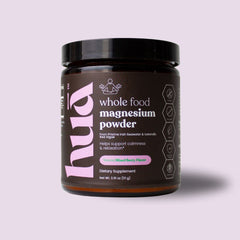Melatonin and Heart Failure: What the New Study Really Means – and How to Support Better Sleep Naturally
If you’ve seen the headlines about melatonin and heart failure risk this week…
Melatonin has long been the quick fix for sleepless nights, but new research has many people asking: is long-term melatonin use safe for your heart?
Before the panic scroll begins, let’s look at what the science actually says - and explore alternative ways to help you sleep.

What the research says
Earlier this week, the American Heart Association released preliminary findings from a research abstract ahead of its annual conference, suggesting a possible link between long-term melatonin use and an increased risk of heart disease.
In this observational study, scientists reviewed health data from over 130,000 adults with insomnia and noticed that those using melatonin long-term (12 months or more) had a 90% higher chance of developing heart failure over the next 5 years.
Additionally, participants who took melatonin were more likely to be hospitalized for heart failure than those who did not (19.0% vs. 6.6%) and were nearly twice as likely to die from any cause over the five-year period (7.8% vs. 4.3%).
It’s worth noting that preliminary means the research hasn’t been peer-reviewed yet, and because it’s an abstract, the full study hasn’t been published in a scientific journal.
The study at a glance
- Who: 130 000 adults with insomnia whose electronic health records were reviewed.
- What: Researchers observed that people taking melatonin for a year or longer were more likely to be diagnosed or hospitalized with heart failure during the next five years.
- How: This was an observational analysis, meaning scientists tracked existing behavior rather than randomly assigning people to take melatonin or not, as they would in a controlled trial. It shows correlation, not causation.
- Why it matters: Chronic insomnia affects more than 25 million adults in the United States, and melatonin supplements are among the most common sleep aids. The new findings remind us that the relationship between sleep, hormones, and heart health is complex and is still being studied.
What this means for you
The takeaway isn’t panic; it’s perspective. Melatonin isn’t harmful for everyone, but this preliminary study suggests it also isn’t completely harmless, especially when used long-term. It’s a hormone that signals sleep, and using it long-term without medical guidance may not address the real reasons rest feels elusive.
The deeper root causes you may need to address could be stress, screen time, blue light exposure, and even the idea of revenge bedtime procrastination.
This research is a reminder that sustainable sleep starts with lifestyle changes first—stress management, better bedtime habits, and nutrition. Gentler, natural products like magnesium can complement those efforts by helping the body regulate its own rhythm.
Melatonin vs. Magnesium – Which is safer for better sleep?
Magnesium is also a popular supplement people take to help them sleep so this news may make you wonder: does magnesium have the same risk for heart disease?
The short answer: no — and the reason lies in how differently these two substances work. One is a hormone your body produces (melatonin), while the other is a mineral nutrient your body must consume (magnesium).
The key difference, summarized:
- Melatonin is a hormone your brain makes when it’s dark. While melatonin is present in small amounts in some foods, we don’t generally consume it from food, and any supplement form is likely a lab-made version of that hormone; there’s no such thing as a “natural melatonin” supplement.
- Magnesium is a mineral nutrient we need to consume from our diet because we don't make it in our bodies. It supports muscle relaxation, nerve health, and the parasympathetic (“rest-and-digest”) response, helping your body make its own melatonin naturally. Magnesium is found abundantly in nature and can be taken as a natural supplement like our Whole Food Marine Magnesium Powder.
No credible research suggests that magnesium supplements increase risk of heart disease. In fact, the vast majority of scientific literature shows the opposite — that magnesium is essential for cardiovascular health and that low magnesium levels are associated with increased risk of heart disease, arrhythmias, and hypertension.
Furthermore, magnesium supplements don’t carry the risk of dependence that melatonin supplements may have. While melatonin isn’t considered addictive, some research suggests that long-term or high-dose use may reduce the body’s own melatonin production or lead to rebound insomnia when discontinued — a mild form of reliance where the body “forgets” how to fall asleep without supplemental melatonin.
Magnesium, on the other hand, doesn’t replace a hormone your body makes. It replenishes something you’re meant to consume. When taken responsibly, it helps the heart, the muscles, and the nervous system work as they should.
That’s why many wellness practitioners prefer magnesium over melatonin supplements as a gentler, more foundational way to prepare the body for sleep.
“Better sleep starts in your kitchen,” says certified holistic nutritionist Amelia Steeger. “I encourage my clients to eat magnesium-rich foods – like dark leafy greens and nuts –and, when needed, add a natural magnesium supplement to help the body unwind.”
Lifestyle changes to improve sleep naturally
While magnesium can be a gentler, more natural sleep aid, it’s important to remember that all supplements are just that—supplementary. The foundation of good sleep still lies in daily habits and routines that help your body feel safe enough to rest. Here are a few small, tangible shifts you can start today:
- Step outside in daylight first thing in the morning to reset your circadian rhythm.
- Dim lights an hour before bed and avoid bright screens.
- Build a nightly ritual to signal your brain for bed: stretching, journaling, or reading.
- Support your body’s own melatonin production through balanced nutrition and gentle, natural supplements like our Whole Food Marine Magnesium Powder.
- Always consult a healthcare professional if sleep issues persist
The bottom line
This new study doesn’t mean taking melatonin is inherently harmful. It means our approach to rest deserves more curiosity and care. Sleep is a reflection of how we live, not just what we take. Research in this area is still unfolding and requires additional examination. As studies continue to evolve, the best approach is one rooted in balance and nurturing your body’s rhythms.
This article is for general informational purposes and is not medical advice. Always consult a qualified healthcare professional before taking supplements or medications.


